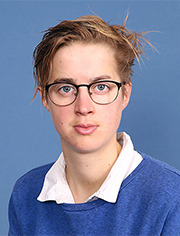Visiting Researcher Dr Lizzie Richardson
Dr Lizzie Richardson, Department of Geography, Durham University, visiting CIM during the Spring term

Lizzie Richardson is a Leverhulme Early Career Fellow in the Department of Geography at Durham University, UK. Her research focuses on the performance and qualification of work as an economic activity. She is particularly interested in the technologies and devices through which work is made (in)visible and accounted for. This includes an ongoing interest from her PhD research on cultural production that focuses on the role of devices such as workshops, projects and events in how “culture” is assembled and qualified. In her current fellowship, she is examining technologies of work from two different empirical starting points. One focuses on the office and the historical and contemporary development of technologies that make information and its communication into work, and through this standardise occupational roles. The other strand focuses on the market role of food delivery platforms in creating a particular type of good - the “delivered meal” - that occurs as both a link between supply and demand, and as a service provider; producing new performances of service work at points of interaction between autonomous but interacting networks. Her disciplinary training is in human geography but her work increasingly intersects with science and technology studies, economic sociology and media and cultural studies. To know more about Lizzie’s research please visit: https://www.dur.ac.uk/geography/staff/geogstaffhidden/?id=15374
During her stay, Lizzie will present her research at CIMs Research Forum the 30 January 12.15-1.45 – Room S1.50
Title: “Office space and doing digital business”
Abstract
Offices are spaces through which business is organised and performed. To understand how business is done in a digital age this paper therefore proposes to examine transformations of office space in England. It is necessary more than ever to understand offices as technocultural spaces – constituted by the reciprocal relationship between technologies and normative standards of performing – where a fixed physical building is by no means always the most important element. Contemporary offices constitute digital business through apparently contrary processes of spatio-temporal fragmentation and extension. Physical offices are parcelled into smaller rentable commodities that both enable and react to the extension of business beyond the purpose-built office building. This fragmentation and extension of offices is set out through a focus on (i) the changing devices of office business notably social tools and cloud storage; (ii) the organisation of markets for office space particularly changing rental structures and the rise of casual or short term leases (iii) the emergence of offices as event spaces and destination hubs for mobile business (and social) activities. The paper forms part of a wider project focusing on the historical and contemporary role of office technologies in shaping the norms and standards of knowledge production and communication, which measure and perform social life in and beyond “the office”.
